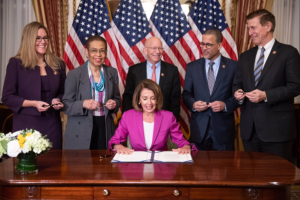Speaker of the U.S. House of Representatives Nancy Pelosi (D-Calif.) and House Democratic leaders endorsed the Washington, D.C. Admission Act, which would make D.C. the 51st state in the United States. The District’s non-voting representative in Congress, Del. Eleanor Holmes Norton (D-D.C.), introduced the bill on Jan. 3 with 155 original cosponsors, setting the record for a bill introduced on the first day of Congress.
Pelosi issued a statement Jan. 4 expressing support for the bill. H.R. 51 will allow D.C. residents the same representation in Congress that residents of states are afforded, Pelosi said.
“The right to vote and to equal representation is the foundation of our freedom and a core pillar of our democracy,” Pelosi said in the news release. “For too long, the residents of the District of Columbia have served our nation in uniform, paid taxes and contributed to the economic power and success of our country while being denied the full enfranchisement that is their right.”

Under current law, Norton and the five delegates representing Puerto Rico, American Samoa, Guam, the U.S. Virgin Islands and the Northern Mariana Islands can only vote when the whole House votes and when the House is controlled by Democrats, according to The Washington Post. However, if the delegates change the result of a vote, that result is ignored and a new vote is taken.
The house has not voted on D.C. statehood since 1993, when the bill failed 153-277, according to The Washington Post.
Norton and other D.C. officials such as Mayor Muriel Bowser (D) have long advocated for statehood, most recently including a March 2017 bill introduced to the 115th Congress. The House did not vote on the bill even though it received support from a supermajority of Democrats. In a November 2016 referendum on statehood, over 80 percent of D.C. residents voted in favor of the measure, but no legislative changes followed.
The House Committee on Oversight and Reform will hold a hearing and markup on the D.C. Statehood Bill later this year, according to a press release from Norton’s office. The bill has also received support from Elijah Cummings (D-Md.), chairman of House Oversight, who cited the need to protect all citizens’ rights as his reason for backing the bill in a news release.
“We must protect the rights of everyone across the country, including the hundreds of thousands of American citizens who live in our nation’s capital,” Cummings said. “I plan to schedule a hearing and markup this year in the Oversight Committee.”
Congresswoman Norton expressed gratitude for the record level of support for D.C. statehood in a Jan. 3 press release, noting the hearing and markup as a way to increase exposure for the issue.
“A hearing and markup will provide a prime opportunity to inform and remind Americans that over 700,000 of their fellow citizens who live in the nation’s capital are denied their basic democratic rights,” Norton said.
Due to lack of representation for residents in Congress, 11 D.C. residents filed a lawsuit in Nov. 2018 in conjunction with the D.C. Appleseed Center for Law and Justice, Washington, D.C.’s chapter of the national of the nonprofit social justice center.
Findings supporting D.C. statehood were also included in a bill that would significantly reform campaign finance law and voting accessibility laws introduced by House Democrats on Jan. 3.
Pelosi said the push for D.C. voting rights and statehood will accompany Democrats’ efforts to strengthen the D.C. Voting Rights Act of 2007, which Congress recognized as having the power to give voting rights to a state under the district clause.
Though new Democratic leadership has supported the bill, Republicans in the House have historically been supported measures to limit D.C.’s ability to govern itself rather than move it closer to statehood.
Georgetown University government professor Stephen Wayne expressed doubts about the success of the statehood movement due to Republican concerns about increasing the number of Democratic senators.
“If the District had two senators, that would increase to 102 the number of senators and that would give the Democrats two more. Republicans are going to oppose that,” Wayne said in a 2016 interview with The Hoya. “Every one of the states would feel that they’re going to be losing a little power if two more senators are added.”




















